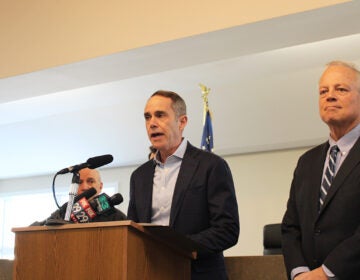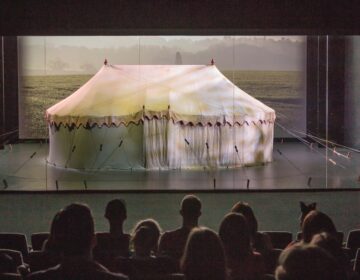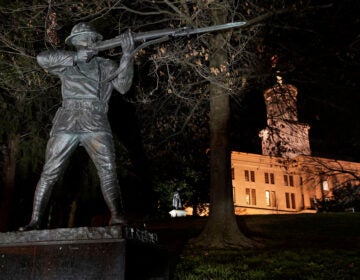Long-lost Revolutionary War-era book returns to Pennsylvania
Historians are always a bit skeptical about items supposedly from the 1770s because of all the reproductions out there, but this volume proved to be the real deal.
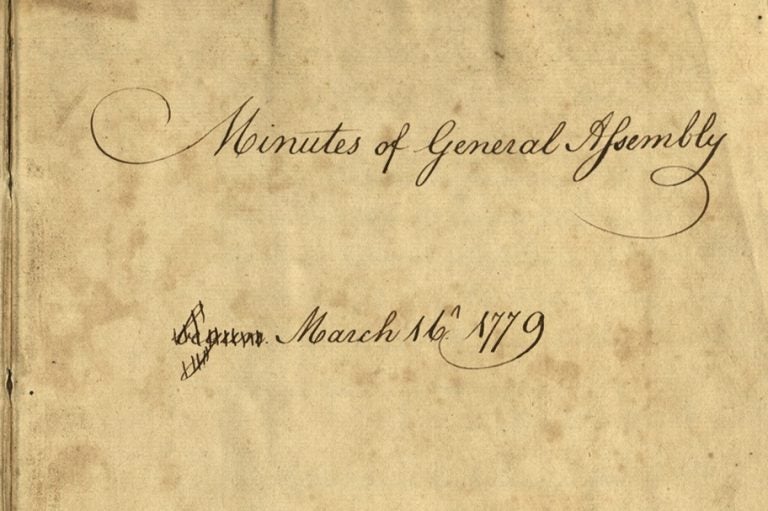
An original 1779 minute book of Pennsylvania’s unicameral Revolutionary General Assembly has returned to Pennsylvania for safekeeping in the Pennsylvania State Archives. (Pennsylvania Historical and Museum Commission)
A long-lost book from the Revolutionary War era has returned to Pennsylvania.
The volume kept track of the 1779 Pennsylvania General Assembly’s daily work. Lawmakers addressed such matters as providing pensions to military widows; obtaining supplies for the Continental Army; and responding to Native American raids.
“It gives us a better idea of what was going on, what was being considered, and what they prioritized during that time period,” said Aaron McWilliams, an archivist with the Pennsylvania State Archives. “It’s also important in that it’s part of Pennsylvania’s history, in its original document from this time period.”
The entries outline legislators’ travel per diems, citizens’ oaths of state allegiance, and pay for state militia.
The commonwealth’s oldest General Assembly minutes show what lawmakers prioritized during the war — and edits show what they considered, McWilliams said.
He points out that, after the widows of soldiers petitioned for pensions, the General Assembly recognized there should be pensions for regular men of the military, not just officers.
While there are transcripts of the book entries in existence, the original reveals adjustments — and the discussions that led to those changes.
“This has the actual writing, words crossed out and written in … the editing that’s in there,” he said.
McWilliams said historians are always a bit skeptical about items said to be from the 1770s because of all the reproductions circulating.
“There’s companies out there that do really good or authentic reproductions. So we always look at things with a skeptical eye,” he said. “Once we determine that it is certainly a real volume — and it belongs or fits within our collection — at that point, we get very excited about it because we are missing a volume for that.”
To verify the item, archivists looked at handwriting, signatures, and the fact that the volume ended on page 183. The next volume in the state collection begins on page 184.
It’s in great shape for being 239 years old, noted McWilliams.
The 1779 volume also covers the time when people are starting to look West and moving to the frontier, which included Northumberland County.
“It was when the raids on the western frontiers of Pennsylvania had picked up significantly. This is just after the period known as the ‘Big Runaway,’ ” McWilliams said, referring to the mass evacuation of settlers following Native American raids.
Gen. George Washington “agreed to release some units from the Continental Army, along with some militia units and ranger units in the state, and they decide to have a expedition up through the frontiers in Pennsylvania.
“So they went largely burning villages … as an effort to try and stop the raids,” he said of the Sullivan Expedition, a scorched-earth campaign that destroyed more than 40 Iroquois villages and crop stores in New York state.
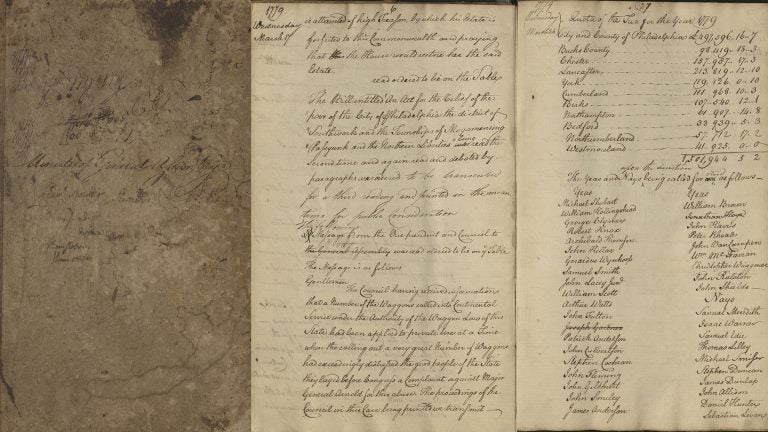
A fortuitous route back to Pennsylvania
The text turned up at Belden Noble Memorial Library in upstate New York. After a library board member notified Pennsylvania officials, commonwealth archivists authenticated the book.
Because Pennsylvania doesn’t have a law allowing it to take back public items that have found their way into private hands, the only options were to pay for it — which McWilliams said the state archives could not afford — or count on the generosity of the owner.
The owner, Edie Morris, proved to be quite magnanimous.
“Other times people say, ‘You can purchase it from me. How much is it worth? That’s what I want,’ ” the archivist said. “At that point, we really have no recourse to get it back for the most part.”
Historians consider items such as the 1779 minutes priceless, McWilliams said, and don’t put price tags on them.
Morris, who inherited a family home where the volume was found, said she didn’t know how it came into her family’s possession, though she does have Colonial-era Philadelphia ancestors.
“When it’s donated to us, that is is something very unique. It does happen, but doesn’t happen all the time,” said McWilliams. “That’s what makes this even more unique, especially something this valuable.”
You can read the historic volume online in the archives, but to view the book in person, you’ll have to make an appointment.
WHYY is your source for fact-based, in-depth journalism and information. As a nonprofit organization, we rely on financial support from readers like you. Please give today.


